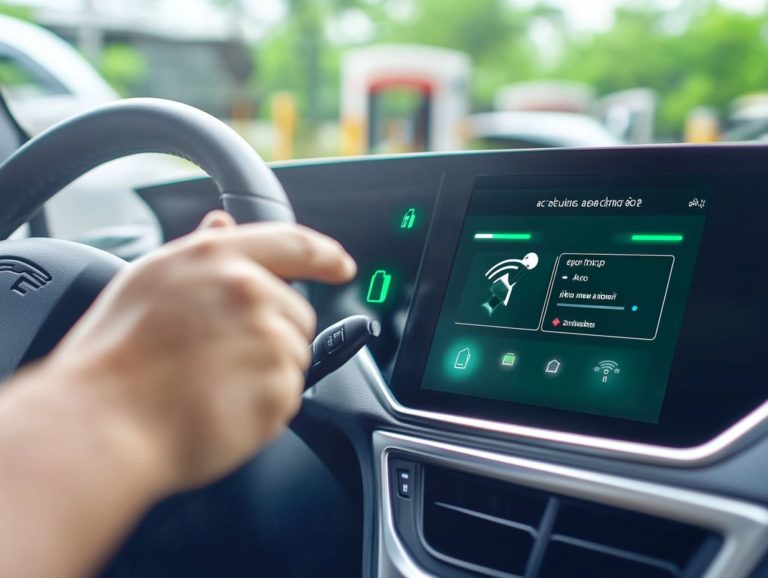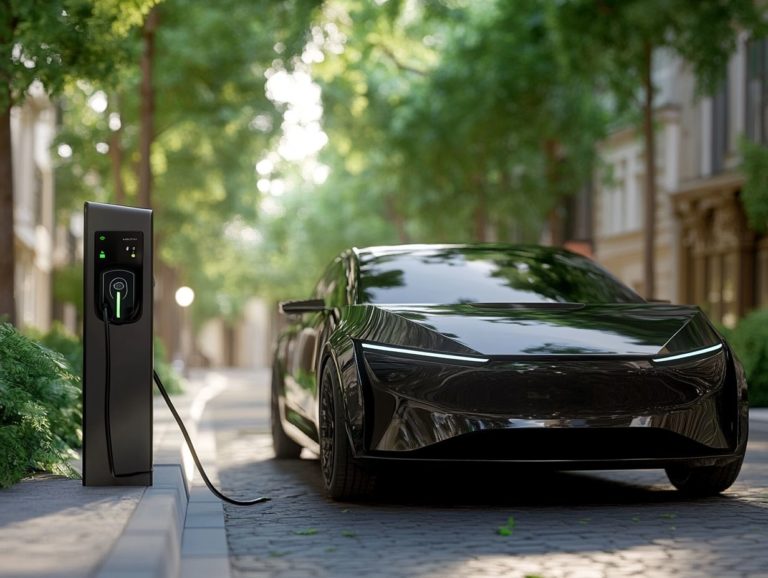how to prepare for an electric vehicle purchase?
Considering a transition to an electric vehicle (EV)? You re certainly in good company. As the demand for sustainable transportation options rises, grasping the nuances of EVs is crucial.
This article delves into various aspects, from the advantages of embracing electric to financial considerations and how to set up your home for charging. It also provides guidance on researching models, exploring available incentives, and facilitating a seamless shift to your new vehicle.
Immerse yourself in these insights to empower your journey toward eco-friendly driving!
Contents
- Key Takeaways:
- Preparing for an Electric Vehicle Purchase
- Financial Considerations
- Preparing Your Home for an Electric Vehicle
- Making the Switch to an Electric Vehicle
- Frequently Asked Questions
- What should I consider before purchasing an electric vehicle?
- How can I research and compare different electric vehicle models?
- What are the benefits of owning an electric vehicle?
- How can I ensure that I have access to charging stations for my electric vehicle?
- What steps should I take to prepare my home for an electric vehicle?
- How do I calculate the overall cost of having an electric vehicle?
Key Takeaways:
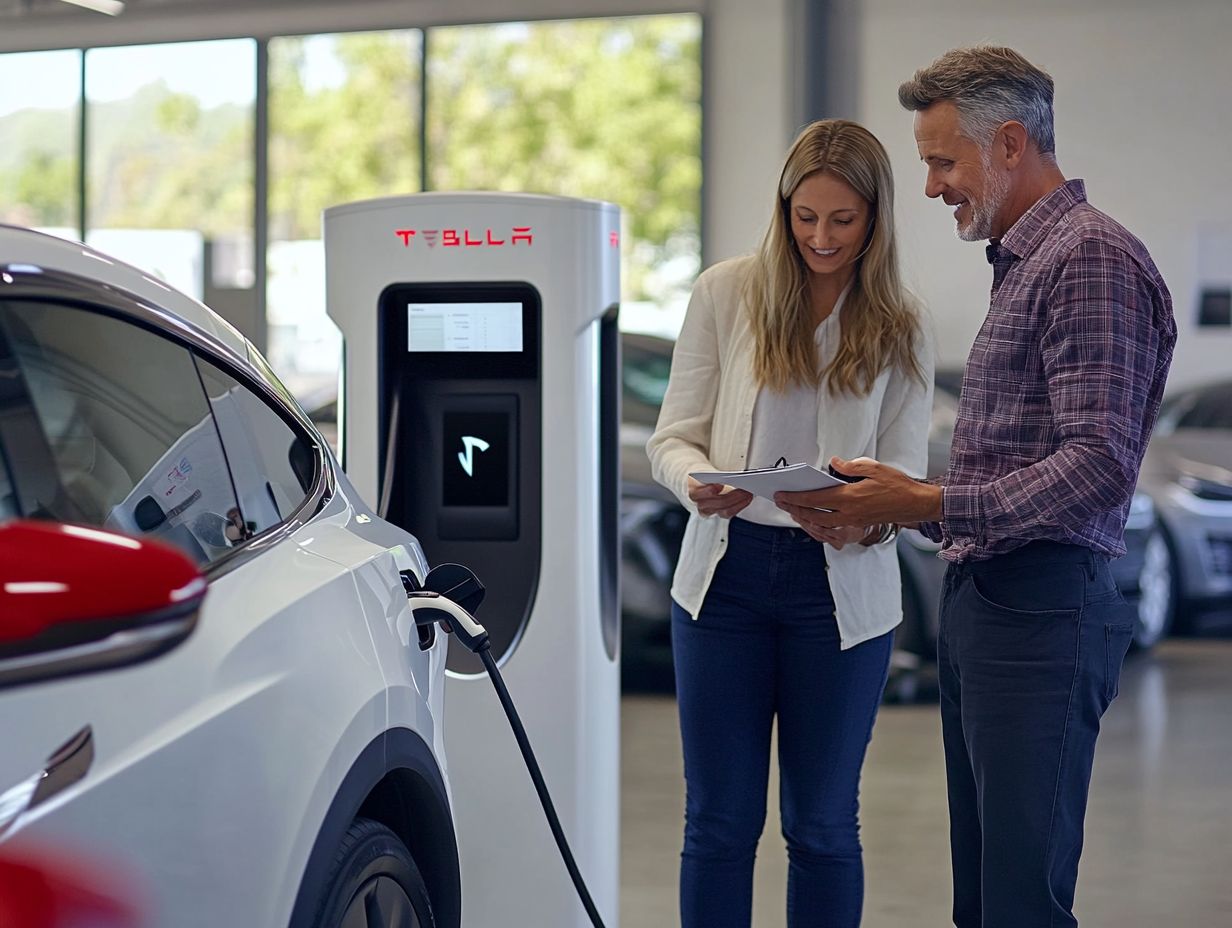
Do your research and compare different models to find the best fit for your needs and budget.
Understand the various charging options available and consider installing a charging station at home for convenience.
Consider the financial aspects of owning an electric vehicle, including cost of ownership and potential incentives and tax credits.
What are Electric Vehicles?
Electric Vehicles (EVs) are reshaping the automotive world, presenting a compelling alternative to traditional gas-powered cars. These innovative vehicles harness advanced battery technology, allowing them to operate on electricity and significantly reduce dependence on fossil fuels.
The mechanics behind EVs are intriguing. They feature electric motors and advanced power systems that optimize both efficiency and performance. Battery Electric Vehicles (BEVs) use only electricity stored in large batteries. Plug-in hybrids combine an electric motor with a gasoline engine, giving you flexibility for longer trips.
Brands like Kia, Nissan, and Tesla are leading this revolution, not only providing popular models but also pushing the boundaries of range, charging speeds, and technological integration.
Switching to electric vehicles can drastically cut your carbon footprint. These cars play a crucial role in combating climate change and aligning with global initiatives for a sustainable future.
Benefits of Electric Vehicles
Electric Vehicles (EVs) offer a compelling array of benefits that may just make them your ideal choice.
First and foremost, the environmental advantages are considerable. EVs produce zero tailpipe emissions, playing an essential role in the fight against climate change. Maintenance costs tend to be lower compared to traditional vehicles, thanks to fewer moving parts.
Government incentives and tax rebates significantly reduce the total cost of ownership, making EVs accessible to a broader audience. While you might have concerns about range anxiety and charging options, advancements in battery technology and the expansion of public charging infrastructure are steadily easing those worries.
Beyond immediate environmental benefits, driving an electric vehicle can lead to substantial savings throughout its lifespan. Charging your EV usually costs less than filling up a gasoline-powered car. Many utilities even offer special rates for off-peak charging, amplifying your savings even further.
The evolution of charging technology, including the increasing availability of fast-charging stations, has made it more convenient for you to manage your time and travel plans.
As a result, the once intimidating fear of running out of charge on long trips is rapidly fading. You can fully embrace the electric vehicle lifestyle with confidence.
Preparing for an Electric Vehicle Purchase
Preparing for your electric vehicle purchase involves several essential steps that empower you to make informed decisions, especially as the market for electric cars like the Kia EV6 and Nissan Leaf continues to grow. Be sure to consider what you should ask when buying an electric vehicle to ensure you choose the right option for your needs.
Start by researching different EV models and comparing their features, including charging options, range, and battery life. Understanding how to test drive an electric vehicle is crucial to grasp the unique attributes of each electric vehicle, including performance and how well they fit your personal needs.
This understanding will guide you in making a truly educated choice.
Start your journey to an electric vehicle today and help make a difference!
Researching and Comparing Models
Researching and comparing models is essential when you’re considering the purchase of an electric vehicle. After making your choice, knowing what to look for in an EV after purchase will help you maximize its potential, as each option comes with its own unique features and advantages.
Take the Kia EV6, for instance; it stands out with its innovative design and impressive driving range. On the other hand, the Nissan Leaf shines for its affordability and practicality.
Then you have models like the Hyundai Ioniq 5 and Tesla, which further enrich the market, offering you a range of choices that balance performance, range, and total cost of ownership.
As you explore these vehicles, consider how each one fits into your life. Think carefully about their driving ranges; this can significantly affect your daily usability.
The battery technology in each model is also crucial as it influences both charging times and longevity. Cost is another important consideration.
While you may lean toward budget-friendly options like the Leaf, you might also find yourself tempted by the advanced features and superior performance of a Tesla. Every model has its unique selling points whether it s the spacious interior of the Ioniq 5 or the cutting-edge tech in the EV6 catering to specific lifestyles and preferences.
Therefore, take the time to assess your personal driving habits and needs, ensuring that the vehicle you choose aligns perfectly with your expectations and lifestyle.
Understanding Charging Options
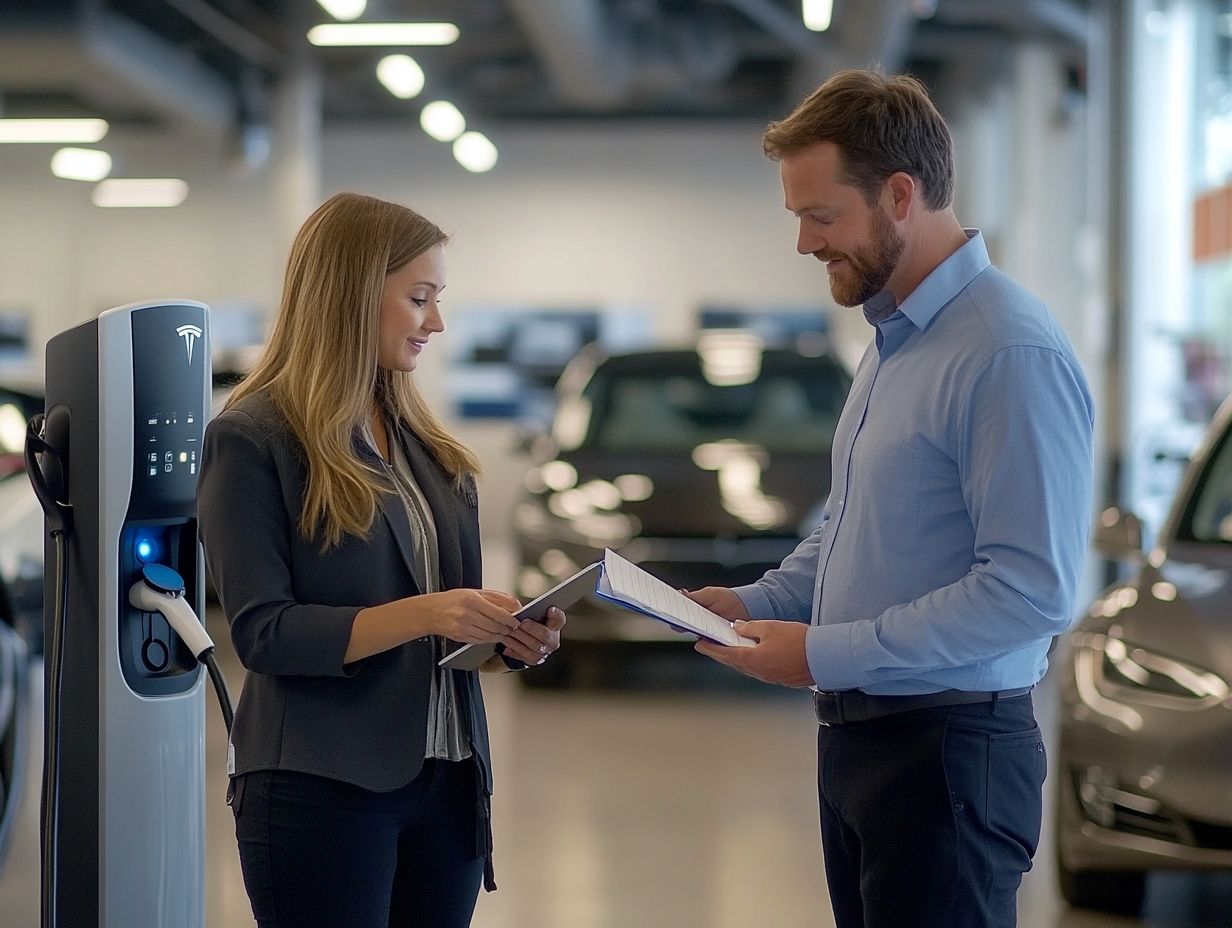
Understanding your charging options is essential when it comes to owning an electric vehicle, as it profoundly influences your driving experience and overall convenience. You can set up home charging solutions, such as a 240-volt outlet, to conveniently recharge your vehicle overnight.
Meanwhile, public charging stations offer the flexibility you need for those longer journeys. By familiarizing yourself with the different charging speeds and types like Level 1 chargers, which use a standard outlet, and Level 2 chargers, which provide faster charging you ll ensure a smooth transition to electric driving.
Understanding these charging methods gives you the power to make informed choices that align with your lifestyle. Using a 240-volt outlet for home charging not only accelerates the process but also allows you the luxury of recharging right in your driveway.
This often leads to significant cost savings over time. On the flip side, public charging stations are invaluable when you’re traveling longer distances.
They provide various charging speeds whether you need a quick top-up during a rest stop or a more leisurely charge while you indulge in some shopping. This comprehensive understanding of the charging infrastructure will enable you to maximize your vehicle s potential and ease any range anxiety you may have.
Financial Considerations
When you consider the financial implications of purchasing an electric vehicle (EV), grasping the total cost of ownership becomes crucial for making an informed choice. While EVs typically present higher upfront costs, the potential for significant savings unfolds over time through reduced maintenance and fuel expenses.
Government incentives and tax rebates can also significantly reduce the initial cost, enabling you to fully capitalize on the financial benefits that electric vehicles offer.
Cost of Ownership
The cost of ownership for an electric vehicle involves a range of factors, including the purchase price, maintenance costs, and charging expenses. Unlike traditional vehicles, EVs typically enjoy lower maintenance costs due to fewer moving parts and less frequent servicing.
Charging costs can fluctuate based on electricity rates and the convenience of home charging, which can significantly influence your overall cost of ownership. Potential tax incentives and rebates can help offset the initial purchase price, making EVs a more financially appealing option in the long run.
You should also consider the resale value of electric vehicles, which has been on the rise as demand continues to grow. This trend stands in stark contrast to many traditional cars, which often depreciate more quickly.
Together, these factors underscore how investing in an electric vehicle can lead to substantial savings over time, enhancing its attractiveness for the environmentally conscious consumer seeking cost-effective transportation.
Incentivos y Cr ditos Fiscales
Government incentives and tax credits enhance the financial accessibility of electric vehicles (EVs) for you. Many states offer enticing tax rebates and other financial benefits for purchasing EVs, effectively lowering your overall purchase price.
Unlock amazing savings by understanding these incentives! For example, California provides up to $2,000 in rebates through the Clean Vehicle Rebate Project. New York also offers tax credits that can reach $2,000, along with additional incentives tailored for low- and moderate-income households.
You can benefit from federal tax credits that amount to $7,500, depending on the manufacturer and battery capacity of the vehicle you choose. Some local utilities offer rebates or special rates for electric vehicle charging as well, enhancing affordability.
By capitalizing on these diverse programs, you can dramatically lower your costs today, making the transition to electric vehicles much more appealing.
Preparing Your Home for an Electric Vehicle
Preparing your home for an electric vehicle entails several essential considerations. A major focus is on installing a dependable home charging station.
An efficient charging station, powered by a strong power source, guarantees that your EV charges swiftly and conveniently, ensuring it s ready for use at a moment s notice.
Assessing your home s electrical system may uncover the need for upgrades to meet the power demands of your electric vehicle, facilitating a hassle-free charging experience.
Installing a Charging Station
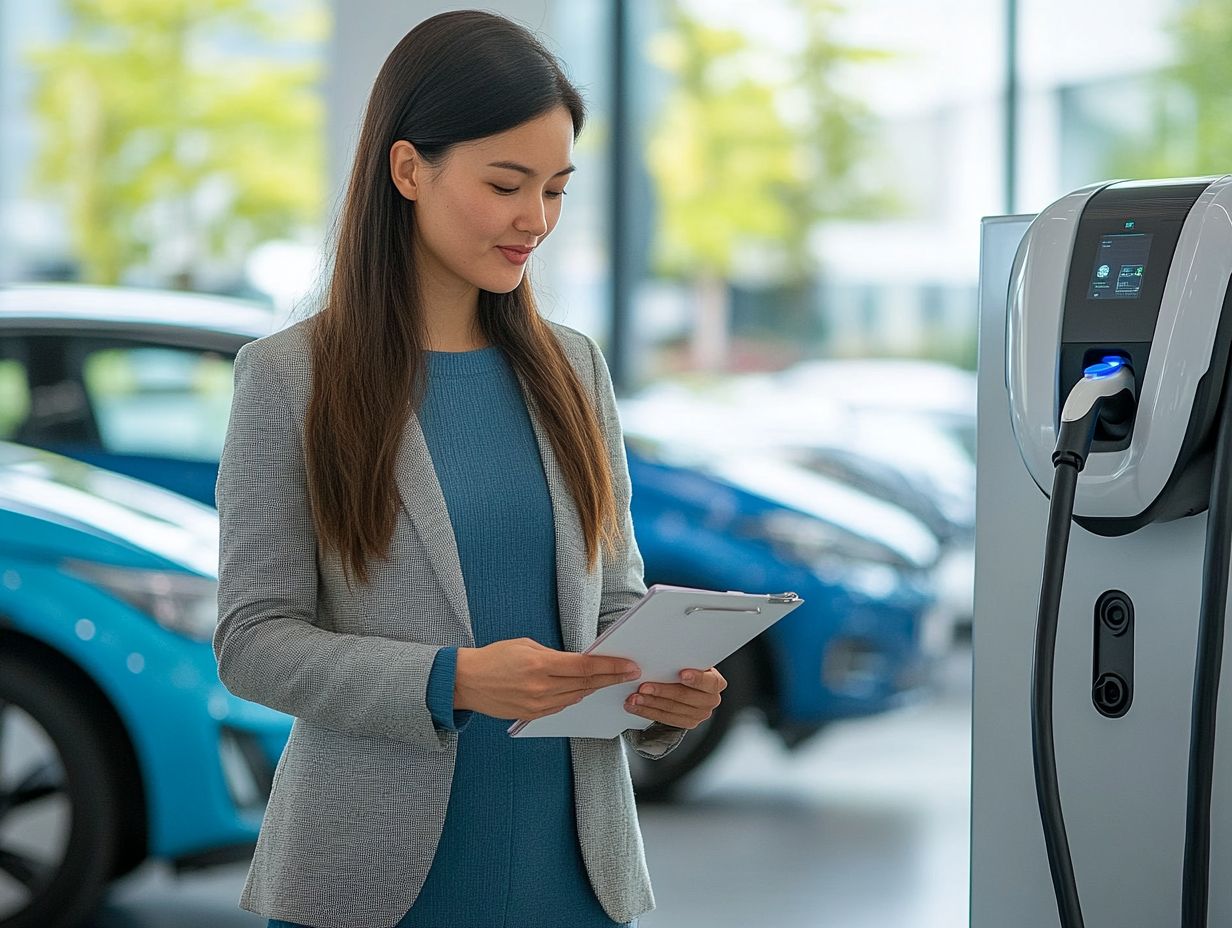
Installing a charging station at home is a pivotal move to enhance your electric vehicle experience. The process involves setting up a dedicated charging unit, which often requires a strong power source to achieve optimal charging speed.
While installation costs can vary, investing in a high-quality charging station promises substantial long-term savings in both time and convenience. When you embark on this installation journey, expect essential components like a charging cable, a circuit breaker, and a home energy management system tailored to your needs.
On average, installation costs range from $500 to $2,500, influenced by complexity and local labor rates. With a fast charging option at your disposal, you’ll elevate the efficiency of your electric vehicle ownership and minimize downtime throughout your day.
Familiarize yourself with local regulations; permits may be required. This step ensures compliance with safety codes while protecting your investment in electric vehicle technology.
Considerations for Homeowners’ Associations
When considering the installation of a charging station for your electric vehicle, pay attention to the policies and regulations set by your homeowners’ association (HOA). These associations often have specific guidelines regarding the installation of charging equipment, which can significantly affect your ability to charge your vehicle efficiently at home.
Understanding these regulations and communicating with your HOA is essential to ensure compliance and facilitate a smooth installation. You might encounter challenges, including design restrictions and aesthetic concerns.
Some HOAs may require prior approval for installation, while others could impose restrictions on the types of chargers allowed or mandate specific installation practices to maintain neighborhood uniformity.
To navigate these complexities successfully, gather detailed information about your HOA’s guidelines and engage in discussions with board members. Document the process and stay informed about policy changes to empower your efforts in creating a sustainable living environment.
Ready to charge your electric vehicle hassle-free? Start your journey to a sustainable electric future today!
Making the Switch to an Electric Vehicle
Transitioning to an electric vehicle means you’ll need to rethink your driving habits and understand the details of electric driving. Moving away from a traditional gas-powered car involves evaluating aspects like your charging routines, driving range, and maintenance practices.
With careful planning and a willingness to adapt, this switch can transform your driving experience into one that’s enjoyable and packed with advantages, including reduced costs and a smaller environmental footprint.
Tips for a Smooth Transition
Achieving a seamless transition to electric vehicle ownership requires adapting your charging habits and understanding your EV’s driving range. For an optimal experience, establish a routine that incorporates regular charging, whether at home or at public stations.
Familiarizing yourself with your vehicle s capabilities can help alleviate worries about running out of battery and enhance your overall driving pleasure.
Start by using smartphone apps to locate charging stations and check their availability in real-time. This makes your trips much more convenient. Charging your EV overnight means you can hit the road stress-free each morning!
When planning longer journeys, always map out your routes with charging stations in mind and keep a charging cable handy for unexpected situations.
Engaging with online communities can provide valuable support and tips from seasoned EV owners, enriching your knowledge and making your experience even more enjoyable.
Maintenance and Care for Electric Vehicles
Maintaining and caring for your electric vehicle is different from looking after gas-powered cars. While EVs typically require less maintenance due to fewer moving parts, it’s essential to regularly check battery life and stay updated with software releases.
Understanding the unique aspects of electric vehicle care can significantly enhance both performance and longevity. Adopting a proactive maintenance schedule is key to keeping your electric vehicle running at its best.
Regularly inspecting battery health not only maximizes your range but also allows you to spot potential issues before they become headaches. Staying informed about software updates from the manufacturer is equally crucial, as these can enhance your vehicle’s performance and introduce exciting new features.
Here are a few additional maintenance tips to consider:
- Rotate your tires to ensure even wear.
- Check brake fluid levels regularly.
- Keep your vehicle clean to prevent corrosion.
Working with a qualified technician who understands electric vehicles will further guarantee that your servicing aligns with manufacturer guidelines, ensuring you achieve the best longevity and performance from your EV.
Frequently Asked Questions
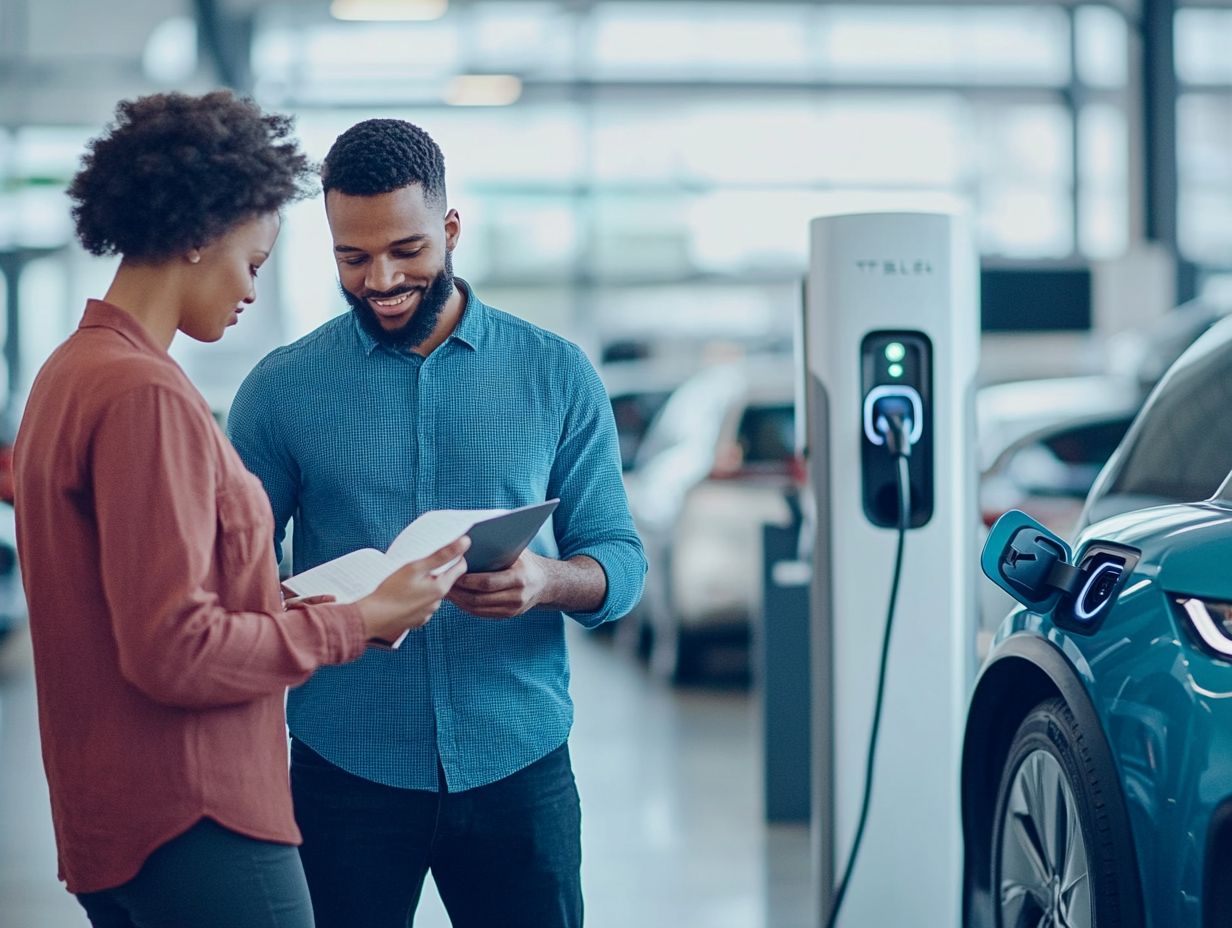
What should I consider before purchasing an electric vehicle?
Before buying an electric vehicle, think about how far you drive daily and if you can easily charge it. You can learn more about this process by exploring how to research electric vehicle options online. Additionally, consider access to charging infrastructure, available tax incentives, and the total cost of ownership compared to a traditional gas-powered vehicle.
How can I research and compare different electric vehicle models?
You can research and compare different electric vehicle models by reading reviews, checking range and performance statistics, and comparing prices. Additionally, it’s important to understand what to know before buying an EV charger. Websites like Edmunds, Kelley Blue Book, and Consumer Reports provide comprehensive information and reviews on various electric vehicle models.
What are the benefits of owning an electric vehicle?
Imagine enjoying lower fuel costs, reduced emissions, potential tax incentives, and a smoother, quieter driving experience. Electric vehicles also have fewer moving parts, resulting in lower maintenance costs.
How can I ensure that I have access to charging stations for my electric vehicle?
To ensure access to charging stations, consider installing a home charging station or using public charging stations. Plan your routes to include stops at charging stations, and check if your electric vehicle manufacturer offers apps to help locate charging stations.
Ready to make the switch? Explore electric vehicles today!
What steps should I take to prepare my home for an electric vehicle?
Get ready for the future! Installing a home charging station is a smart first step.
Make sure your electrical system can meet the extra power needs.
Don t forget to consult a licensed electrician for safe installation!
How do I calculate the overall cost of having an electric vehicle?
Wondering about the true cost of owning an electric vehicle? It s important to look at all the details!
Consider the purchase price, estimated maintenance costs, fuel or electricity costs, and any potential tax incentives.
Check out online calculators to quickly see how much different models will really cost you!

